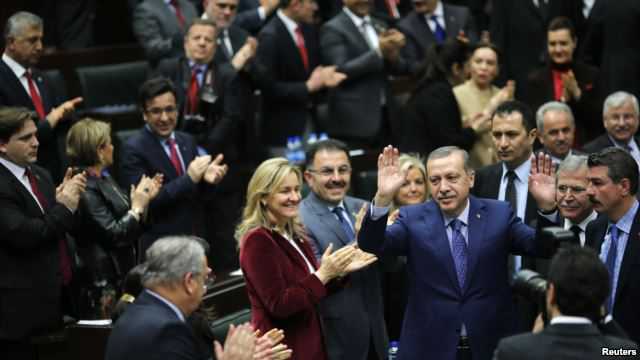Dorian Jones
February 27, 2014
ISTANBUL — The Turkish government is pushing through legislation extending the powers of the country’s National Intelligence Agency, or MIT, and increasing the agency’s protection from prosecution. The move has drawn widespread condemnation and concern following controversial laws extending government control over the judiciary and the Internet.
The Turkish parliament is considering new legislation that will dramatically extend the powers of the MIT. The proposed legislation empowers the MIT to access data, including the bank records of any company or individual. The MIT would also be able to conduct operations against anyone deemed to be a “national security threat.”
The proposed law has drawn strong criticism from human rights groups and legal advocates. Istar Gozaydin, a law professor at Istanbul’s Dogus University, says the legislation would effectively put the agency above the law.
“Non-accountability is one the huge problems in this legislation: the MIT becomes somehow omnipotent. Under this legislation, in order to start an investigation against any personnel that claims to be in the context of the intelligence service, the prime minister has to authorize,” said Gozaydin.
In the face of strong criticism, the government has made some concessions, stepping back from putting the intelligence agency under the prime minister’s direct control. The penalty for people writing on the activities of MIT was also reduced from 12 to nine years in jail.
But critics claim the law was written ambiguously, making it difficult for people to know precisely what violates the law on reporting on the MIT.
Soli Ozel, a political commentator for Haberturk TV, says such ambiguities, and the severity of the sentences, are aimed at intimidating the people.
“When you give MIT so much power, they can do a lot of things with impunity. This has a deterrence effect on anyone who might think about raising their heads or speaking out their minds and whatever. The entire spirit of the law certainly reminds me of intelligence states, and the way their intelligence services operate,” said Ozel. “In the literature, we call [them] ‘Mukhabarat states.'”
But the government argues that extending the intelligence agency’s powers is necessary in its battle against what it says is a parallel state operating in the country. Prime Minister Recep Tayyip Erdogan claims followers of an Islamic scholar Fetullah Gulen, who lives in self-imposed exile in the United States, have infiltrated the judiciary and police and are trying to unseat him through unfounded corruption probes – a charge Gulen strongly denies.
Last December, prosecutors launched a series of investigations into alleged graft and, since then, voice recordings said to be of a telephone conversation between Erdogan and his son in which they discuss how to hide large sums of money have been released on the Internet. The government claims the recordings have been maliciously edited and has blamed Gulen.
Observers say the new intelligence law will make it easier for the MIT to use its powers against the Gulen movement.
That law follows steps by the government to extend its powers over the judiciary and the Internet. But Asli Aydintasbas, a columnist for the Turkish newspaper Milliyet says, such legal moves will ultimately prove counter-productive for the prime minister.
“He is trying to restrict the use of Internet, the judiciary and expand [the] powers of national intelligence-gathering agency. It is adding to the perception that Turkey is becoming more and more authoritarian. So while it might help him or gives tools to fight these prosecutors or prosecutions, or the spread of news on the Internet, in the long run, I think, it’s [the] beginning of his decline,” said Aydintasbas.
Despite the criticism over the bill extending the intelligence agency’s powers, the government has committed itself to passing the legislation, saying it is essential to the country’s security. On Thursday, Prime Minister Erdogan accused those behind the leaked voice recordings of working for unnamed foreign powers. Observers say Turkey’s ongoing political is likely only to deepen.
via Turkey’s Government Tries to Expand Intelligence Agency Powers.
